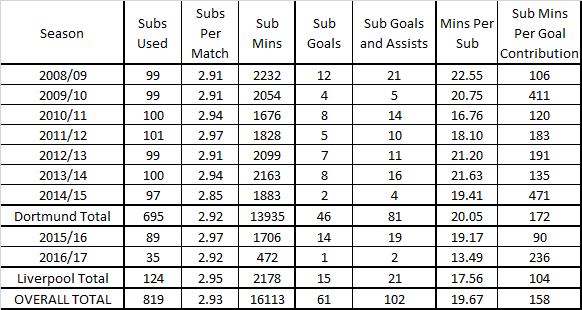[article]Each of us, at one point or another, have found ourselves watching a film ridden with maddening flaws and avoidable mistakes. How did Andy Dufresne stick the poster back up perfectly from the other side? Why did Rose not shuffle over just a little bit to allow room for Jack, before letting go despite telling him she never would? Why is Adam Sandler still paid to make and star in movies?
Three months into this season, and Jurgen Klopp must feel like he is watching the exact same film with the exact same maddening flaws each week. Liverpool had most of the ball, most of the opportunities and most of the shots against Newcastle, but emerged from St James’ Park barely clinging to a 1-1 draw.
If the majesty involved in Philippe Coutinho’s opener – a long-range strike from the left-hand side – felt familiar, so did Newcastle’s equaliser. Jonjo Shelvey sliced through the gaping hole in the central defence to play in Joselu, who only scored as the recovering Joel Matip kicked the ball against his shin. In a season typified by defensive deficiencies, this was a new kind of incompetence from the visitors.
As ever, Liverpool had the chances to take all three points. Mohamed Salah, Daniel Sturridge, Dejan Lovren and Sadio Mane all spurned opportunities as the club again relied on one moment of brilliance to rescue them. They have now had 232 shots in 12 games across all competitions – more than any other side in Europe’s top five leagues. And yet in the Premier League alone, Manchester City, Manchester United and Chelsea have all scored more.
The difference between Klopp and your average viewer on Sunday is that the German had the chance to enact change. He was sitting in the editing booth, the one man able to correct each of the exasperating errors in this latest Liverpool sequel.
Yet it was not until the 74th minute, when Newcastle had reached such a point of comfort and tranquility that deckchairs and sunglasses were being readied, that Klopp made his first substitute. The visitors had not had a single shot since the 54th minute; the manager’s hand was forced.
If Roberto Firmino and Dominic Solanke were handed scant opportunity to really stamp their authority on the game, spare a thought for Alex Oxlade-Chamberlain. The summer signing was afforded six minutes; his entire Premier and Champions League career for Liverpool comprises of 75 minutes across five substitute appearances.
It appears to be Klopp’s Achilles’ heel. In seven Premier League games this season, only once has he made a substitution before 61 minutes, and only three times before the 74th. The only instance of a player rising from the bench to the pitch before the hour mark was against Manchester City – at half-time when two goals and one man down.
A manager must manage, and in that job description he must be able to positively affect a game through either a change in tactics or players. There are but a few reasons to bring on a substitute: to try and rescue a result, to help change the system, to replace an injured player or to waste time while defending a win. To expect players to instantly perform under immense pressure with 15 minutes of a match remaining is to ask them to fight a perennial losing battle.
In seven games, Liverpool substitutes have been afforded 306 minutes – fewer than all but Burnley (283). Klopp has so much misplaced faith in Plan A that he often forgets he has a Plan B at his disposal before it’s too late.[/article]
Dated 28 Aug
Dated May 2017
[article]Only Premier league matches have been considered
Only second half substitutions were considered, since first half are usually in case of injury
[/article]
Dated 23 Nov 2016
https://basstunedtored.com/2016/11/23/klopps-record-with-subs-and-late-goals/
[article]In terms of late goals (which is defined as from the 76th minute onwards for the purposes of this article), just 15% of Liverpool’s league goals under Klopp have been late, compared to a Premier League average of around 22%, and this season it has been just 10%, though again the Reds haven’t required as many late goals in this campaign as they might have. Time-wise, it’s interesting to note that 23% of Liverpool’s goals have been in the first fifteen minutes of the second half this season, which compares favourably to Klopp’s average of 17% at Dortmund, and the Premier League’s average of 16%. Perhaps Klopp’s strength this season has been the half-time pep talk and subtle tactical changes rather than goals from the bench?
Sean asked about late goals in Germany though, so let’s look at that. The below table shows when Dortmund scored their league goals during Klopp’s tenure, and as a comparison I’ve included the Bundesliga average for the final fifteen minutes too.

Klopp’s side were broadly in line with league average for proportion of late goals during his time at Dortmund, though I thought it was interesting that they had a bit of a leap in his third and fourth campaigns when they won the league.
BVB averaged just under fourteen goals per season from the 76th minute onwards, and in Klopp’s 42 Liverpool matches, the Reds have so far scored thirteen, so it would appear that essentially his two sides have scored late goals at roughly the same rate (although there are only thirty-four matches per season in Germany). Dortmund scored 0.41 late goals per game in those seven seasons when the league average was 0.31, though you’d obviously expect them to score more as one of the better sides.
To bring the article full circle, here’s Klopp’s record for using substitutes for both Dortmund and Liverpool.

Last edited:

